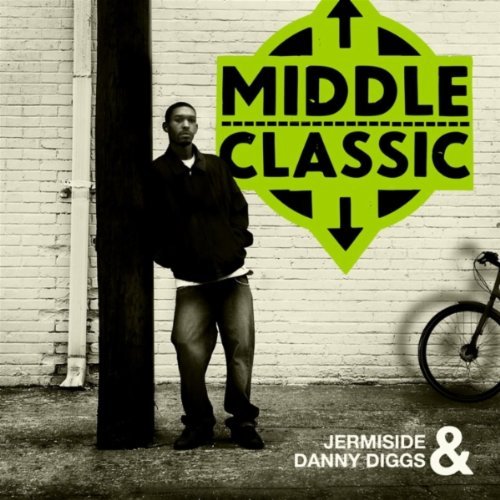
Jermiside & Danny Diggs
Middle Classic
(HipNOTT; 2010)
By Chet Betz | 17 July 2010
Glow-loved Jermiside and newish producer from across the pond Danny Diggs set out on an unusually usual mission with this record. The title’s up-front about it: Middle Class…ic. Get it? Yeah, I know. First let’s parse the “classic” claim: Illmatic (1994) is an obvious template here with the ten proper album tracks including an intro track titled “The Inception” (which in turn reminds me that I should be in a movie theater right now); Diggs’ production is almost too readily boom-bap throwback-ish; the album cover reminds me of Mecca and the Soul Brother (1992); and the three (mostly superior) remixes at the end make me think that Jerm’s pre-emptively reppin’ an anniversary edition. Though this record is very much its own thing, I can’t help but follow along with Colin’s reasoning in his recent review of Fashawn’s ode to Illmatic; isn’t Jermiside, a gifted rapper, doing himself a disservice in consciously positioning his record in direct relation to albums that are true classics?
Because, unfortunately, Middle Classic is definitely not a classic. While young Diggs sports a polished touch, a few inspired moments (“Didn’t I Tell You,” the title track, and—of all things—the shout-outro), and an old soul (like, Premo-old), his approach is a little too soft and a little too safe to produce anything that bangs as dark and raw as a “N.Y. State of Mind” or sublimates heartbreak like a “T.R.O.Y.” Which is a totally unfair comparison except that the record somewhat invites it. And I think both Diggs and Jerm are more humble than that but the connections drawn are clear, however unintended the connotations. When it comes to Jermiside’s shortcomings, Glow’s rap-critic-at-large Aaron Newell proclaims this record as the first time that he noticed how bad Jermiside’s breath control is. I think this may be as much a mixing/production issue as it is a rapping issue because it’s not so much that Jerm places his breaths in poor spots, it’s just that for some reason the inhales sound loud. It’s a double fault, either way, yet it’s nothing that takes away from the warmth and ease of Jerm’s flow, the rap equivalent of sipping bourbon, or the charm of his rhymes, rife as they are with poetic technique. Boy’s got alliteration for days.
What’s really difficult to judge, though, is the application of this nostalgic production and old school emceeing to subject matter that in its aim for sincerity goes on and on about how Jermiside “grew up good” and is doing okay now but maybe could be doing a bit better (“Where We Go”); thus, the “middle class” in the title. Because, I mean, it’s all so totally appropriate and self-aware that it makes it hard to do anything but agree with intentions achieved but then question those intentions. Is it compelling for a rapper to make an album that by and large is about said rapper being middle class? Dealing with the more menial struggles of the common man? It is compelling insomuch as it is reactionary to the general context of the thug- and cred-glorifying rap game, which kinda paradoxically limits how compelling it can be. Is it wrong to appreciate a record like Illmatic because for many of us it paints such a vivid picture of a place and a mind state which we’ll never fully inhabit?
The rhymes on Middle Classic inhabit our work places and patches of lawn, our places of security and often tedium—which is fine, and they do so gracefully, yet without much insight or pathos (“We just maintainin’ / We just maintainin’” goes the hook of “Maintainin’”). Dose One tackled this topic on Subtle’s For Hero : For Fool (2006) but artfully expanded the topic’s horizons, blowing it up into a thousand terrifying, thrilling abstractions and absurdisms. Again, Middle Classic keeps it old school: Jerm does have a genuine “T.R.O.Y.” moment when he mourns his fallen nephew on “Still With Me,” but you’ll have to listen to Kno’s remix to get an adequately melancholic beat…and then there’s the feeling that the song’s sentiment runs too much deeper than the rest of the record. Just look at those song titles: they couldn’t possibly be any more nondescript, could they?
Jermiside is simply too good of a rapper, though, to make a completely nondescript album. Even when I couldn’t care less for what he’s rapping about I’m still deeply feeling how he’s rapping it—and, really, this same reason for acceptance applies to Jerm’s opposites, to coke rappers like Clipse or to when Big Boi over-compensates with lots of nastiness on a track like “Tangerine.” And I feel like Jermiside is smart enough to try to parlay this record’s inherent weakness (that is, mundane subject matter) into a strength; thus, the title, the cover, the consistency of theme. It’s like he and Diggs wanted to make a rap record that’s actively, heck, aggressively MOR and see how far that method could take them. But Jerm shines a little brighter when the only thing he’s focused on is his rapping. That Die Jerm Die mixtape he dropped last year was messy as hell but Jerm was plain vibrant. His rapping popped off the speakers; his rhymes existed for themselves and in that they were beautiful. Here, in his effort to be a part of something cohesive while honestly splaying his background, he kind of misses an opportunity to push himself. We can take or leave the “middle class” stuff, Jerm. It’s the “classic” we care about.





